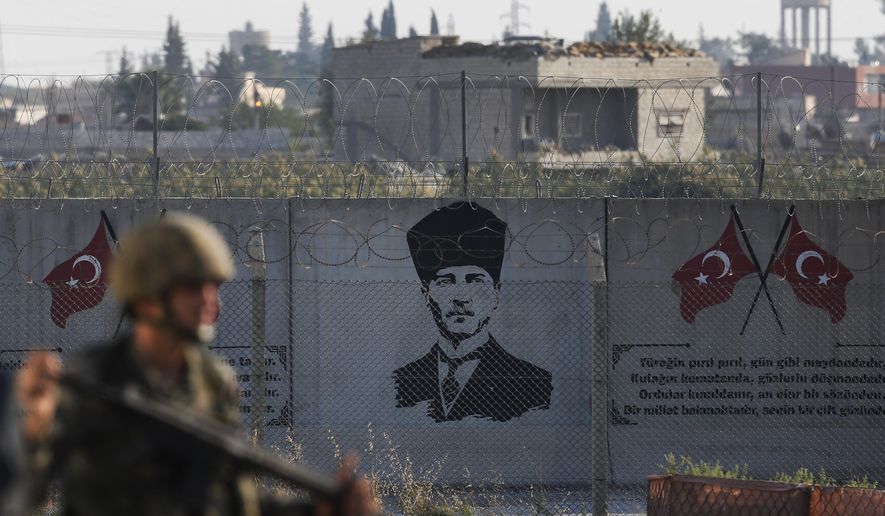OPINION:
Grinch that I am, in the days leading up to Christmas I immersed myself in “The Thirty-Year Genocide: Turkey’s Destruction of its Christian Minorities, 1894-1924.”
The authors of this recently published, extensively researched, 500-page book are Benny Morris and Dror Ze’evi, historians at Israel’s Ben Gurion University of the Negev. “We embarked on this project in quest of the truth about what happened to the Ottoman Armenians during World War I,” they explain. What they found was “incontrovertible” proof of Turkey’s 1915-16 genocide.
Two weeks ago, the U.S. Senate voted unanimously in favor of a resolution, co-sponsored by Sens. Robert Menendez, New Jersey Democrat, and Ted Cruz Texas Republican, to “commemorate the Armenian genocide through official recognition and remembrance.”
The White House disapproved, arguing that such a statement was unhelpful given the fraught state of Turkish-American relations. Ankara has maintained that atrocities happen during times of war and turmoil, but that liquidating an entire community was never the intention.
“The Thirty-Year Genocide” provides ample evidence to the contrary. But it goes further, making the case that the Ottoman Empire in its final years, the Young Turks who came to power following the Ottoman collapse, and even Mustafa Kemal Ataturk, father of the modern Turkish nation, came to regard not just Armenians but all of “Asia Minor’s Christian communities as a danger to their state’s survival and resolved to be rid of this danger.”
The methods used included “mass murder, attrition, expulsion, and forced conversions. By 1924 they had cleansed Asia Minor of its four million-odd Christians.”
Among the motivations, according to Professors Morris and Ze’evi, were “fears of foreign machinations and interference, Turkish nationalism, ethnic rivalries, economic envy, and a desire to maintain political and social dominance. Perpetrators sought power, wealth and sexual gratification.”
But there was another factor, one “politically incorrect” even to discuss: “As an ethos and an ideology, Islam played a cardinal role throughout the process, in each of its stages.”
“We are not arguing here that Islam is a single dogma, worse than other religious dogmas,” the authors explain. “Islam has various streams, and individual Muslims feel differently about questions of practice, scriptural interpretation, and moral behavior. Inherent in Islam are humanistic and moderate traditions, and, as we emphasize in our conclusion, Christians lived in relative security under Ottoman rule for centuries. Indeed, their stand was probably more secure than that of Jews or Muslims under Christian governments during the same centuries.”
Nevertheless, “Islam was an important driver” of the war against Christians. “Ottoman authorities invoked jihad to mobilize the Muslim masses to massacre and plunder. Perpetrators cited jihad and Muslim law more generally to explain and justify their actions, even to argue that these actions were obligatory. Islam was the glue that bound together perpetrating Turks, Kurds, Circassians, Chechens, and Arabs and was the common marker of identity separating them from their Christian victims.”
Setting the historical record straight is useful. More important is to recognize that the war against Christians didn’t end in the last century. It continues to this day in the Middle East, Asia and Africa.
The de-Christianization of Syria, Iraq, Gaza and the West Bank is well underway. In the Islamic Republic of Iran, the estimated 300,000 Christians remaining have been prohibited by law from praying or singing in public, as Nina Shea, a religious freedom expert at the Hudson Institute, explained to Al Arabiya (ironically, one of the few media outlets covering this story). She added: “The regime wants to intimidate Christians not to celebrate their religion, act on their religion, or have any outward signs of it, like wearing a cross.”
Ms. Shea has written also about the 100 million Chinese Christians whose churches have been placed under the direct control of the Communist Party, an officially atheist organization. Last year, more than a million Christians in China were “threatened or persecuted and 5,000 arrested.” Beijing oppresses other religious groups as well, none more than Muslim Uighurs.
Another battleground for Christians is in Africa. In an essay for The Wall Street Journal last week, French philosopher Bernard-Henri Levy writes that in Nigeria, the continent’s most populous nation, the war being waged against Christians is “massive in scale and horrific in brutality. And the world has hardly noticed.”
The perpetrators are Fulani, a large ethnic group, within which a “violent element,” Muslims possibly linked to Boko Haram, “accounted for the majority of the country’s 2,040 documented terrorist fatalities in 2018.” He adds that “whereas Boko Haram are confined to perhaps 5% of Nigerian territory, the Fulani terrorists operate across the country.”
According to Mr. Levy, the government is doing little to help victims. Many Nigerian military and government officials are themselves Fulani, President Muhammadu Buhari among them.
In Lagos, Nigeria’s largest city, a Fulani man tells Mr. Levy: “The Christians are dogs and children of dogs. There is no place here for friends of the whites, who are impure.”
Soon after, a vendor offers Mr. Levy “portraits of Osama bin Laden and Turkish President Recep Tayyip Erdogan.” The vendor tells him “the Christians will eventually leave and Nigeria will be ’free.’”
What I’ve recounted here cannot have made your Christmas merrier. But amid the holiday celebrations, I think you should spare a thought — perhaps even a prayer — for Christians being persecuted in faraway lands. That’s just the kind of Grinch I am.
• Clifford D. May is founder and president of the Foundation for Defense of Democracies (FDD) and a columnist for The Washington Times.




Please read our comment policy before commenting.